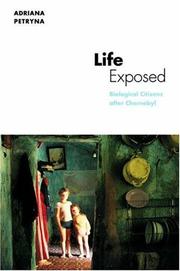| Listing 1 - 1 of 1 |
Sort by
|

ISBN: 9780691090191 0691090181 069109019X 0691151660 1400845092 1299387861 9781400845095 9780691151663 9781299387867 Year: 2013 Publisher: Princeton, NJ
Abstract | Keywords | Export | Availability | Bookmark
 Loading...
Loading...Choose an application
- Reference Manager
- EndNote
- RefWorks (Direct export to RefWorks)
On April 26, 1986, Unit Four of the Chernobyl nuclear reactor exploded in then Soviet Ukraine. More than 3.5 million people in Ukraine alone, not to mention many citizens of surrounding countries, are still suffering the effects. Life Exposed is the first book to comprehensively examine the vexed political, scientific, and social circumstances that followed the disaster. Tracing the story from an initial lack of disclosure to post-Soviet democratizing attempts to compensate sufferers, Adriana Petryna uses anthropological tools to take us into a world whose social realities are far more immediate and stark than those described by policymakers and scientists. She asks: What happens to politics when state officials fail to inform their fellow citizens of real threats to life? What are the moral and political consequences of remedies available in the wake of technological disasters? Through extensive research in state institutions, clinics, laboratories, and with affected families and workers of the so-called Zone, Petryna illustrates how the event and its aftermath have not only shaped the course of an independent nation but have made health a negotiated realm of entitlement. She tracks the emergence of a "biological citizenship" in which assaults on health become the coinage through which sufferers stake claims for biomedical resources, social equity, and human rights. Life Exposed provides an anthropological framework for understanding the politics of emergent democracies, the nature of citizenship claims, and everyday forms of survival as they are interwoven with the profound changes that accompanied the collapse of the Soviet Union.
Chernobyl Nuclear Accident, Chornobyl', Ukraine, 1986 --- Radioactive pollution --- Tchernobyl, Accident nucléaire de, Ukraine, 1986 --- Accident nucléaire de Tchernobyl, Tchernobyl, Ukraine, 1986 --- Pollution radioactive --- Health aspects --- Aspect sanitaire --- #SBIB:39A4 --- #SBIB:39A72 --- #SBIB:328H263 --- Toegepaste antropologie --- Etnografie: Europa --- Instellingen en beleid: andere GOS-staten --- Chernobyl Nuclear Accident, Chornobylʹ, Ukraine, 1986 --- Environmental radioactivity --- Nuclear pollution --- Radioactivity, Environmental --- Pollution --- Radioactive substances --- Radioecology --- Radioactive waste disposal --- Health aspects. --- Environmental aspects. --- Tchernobyl, Accident nucléaire de, Ukraine, 1986 --- Accident nucléaire de Tchernobyl, Tchernobyl, Ukraine, 1986 --- SOCIAL SCIENCE / Anthropology / General. --- Social aspects. --- Chernobyl aftermath. --- Chernobyl disaster. --- Chernobyl explosion. --- Chernobyl nuclear reactor. --- Chernobyl sufferers. --- Exclusion Zone. --- Radiation Research Center. --- Safe Living Concept. --- Soviet Union. --- Ukraine. --- accountability. --- biological citizenship. --- biological injury. --- bioscientific collaboration. --- catastrophe. --- clinicians. --- compensation. --- corruption. --- disability claims. --- disability. --- doctorаatient relations. --- environment. --- ethics. --- families. --- family histories. --- health. --- human rights. --- human welfare. --- illness. --- in utero research. --- lichnost'. --- life narratives. --- medical classification. --- medical surveillance. --- medical-labor committees. --- nonsufferers. --- nuclear hazard. --- patients. --- personhood. --- post-Soviet Ukraine. --- public health. --- radiation dose exposure. --- radiation research. --- radiation scientists. --- radiation. --- radioactive fallout. --- self. --- sick role sociality. --- social equity. --- social health. --- social identity. --- social protection. --- social welfare goods. --- state building. --- sufferers. --- suffering. --- technological disasters. --- violence. --- welfare claims.
| Listing 1 - 1 of 1 |
Sort by
|

 Search
Search Feedback
Feedback About UniCat
About UniCat  Help
Help News
News